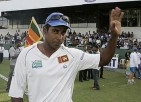The thrill of the draw
Richard Dickinson |In recent times, there has been much talk of how to make Test cricket more “interesting”. Some worthy ideas have been mooted; some have talked of trying to produce more results. Yet some of the most exciting finishes to Test matches ended in draws. Pretty much invariably, this will leave one team (occasionally both) kicking themselves, but it’s still a great spectacle. I’ve ignored games where loss of playing time interfered, as this somewhat taints the thrill for my money, with one team always rightly getting the feeling that they’ve been robbed, and would have won had lost time been possible to make up.
But here’s a quick look at a few of the drawn thrillers from the last decade which saw a full game’s play:
Australia vs. India, Adelaide Oval, 2007/08 – though they already knew they had lost the series, India saved this game on the last day thanks almost exclusively to an audacious 150 from Virender Sehwag, who had only been a last-minute inclusion in the touring party after being left-out of the “probables” list. Australia did just enough for much of the day to keep in with a sniff of victory, however, and the game was still in the balance until Sehwag and wicketkeeper Mahendra Dhoni came together just before Tea. And all the while Michael Clarke knew that his miss of a simple slip catch offered by Sehwag (on 2) the previous evening had almost certainly been the decisive factor in Australia’s failed charge for victory. They had to settle for a 2-1 series win.
West Indies vs. India, ARG, 2006 – games at The ARG weren’t often terribly interesting, apart from when record scores of some sort were at risk. In the Tests there in 2004 and 2005 (both of which were dead final Tests anyway), 2920 runs had been scored for the loss of 37 wickets. But in the opening Test of the 2006 series, India had engineered a turnaround from a big first-innings deficit and had the entire last day to bowl West Indies out. They so nearly managed it. By lunch on the final day the home team had lost three wickets, including lynchpin Brian Lara for a duck, and India looked firm favourites. But a defiant stand between Chris Gayle and Shivnarine Chanderpaul ate-up almost a third of the day’s overs. India once again took command after Tea, and in the final hour they required only three wickets. However, an extraordinary and totally inappropriate innings from spinner Dave Mohammed gave West Indies the sniff of a draw, and genuine rabbits Fidel Edwards and Corey Collymore were able to withstand the tension of the final 19 balls, the impact of which was felt even in the stands, where for a change no one was dancing. The next two were drawn as well, but India managed to win the series anyway, taking the final game.
New Zealand vs. Sri Lanka, McLean Park, 2004/05 – after a snooze-worthy Test for the greater part, this game suddenly came to life midway through the last day as Lasith Malinga hurled his way through New Zealand’s second-innings. Had the Lankans managed to grab the last couple of wickets as quickly as the rest, and had a small number of overs not been lost, they might just have won one of the most unthinkable victories in history. It was a shame for them that they didn’t, as New Zealand took the Second Test and won the series.
India vs. Pakistan, Mohali, 2004/05 – in this opening Test of the series, India achieved a massive first-innings lead and had Pakistan six down leading by just 39 shortly before the fourth-day close. But one of the greatest rearguards in Test history from Abdur Razzaq and Kamran Akmal on the last day staved-off defeat for Pakistan. The rearguard turned-out to be crucial as Pakistan achieved an uplifting 1-1 draw in the series having been distinct second-favourites.
Australia vs. Sri Lanka, Cairns, 2004 – a rare case. Australia piled-up a colossal first-innings and did not win, as the Sri Lankans replied well in their own first dig, then just held-out against defeat on the final day, with Shane Warne’s chase to equal and surpass the Test wicket record of Muttiah Muralitharan (who had pulled-out of the tour) adding to the high drama. The hosts (Warne included) could not quite capture the final two wickets, Upul Chandana, Chaminda Vaas and Nuwan Zoysa gluing themselves to the crease as the day drew to a close. To avert a 2-0 whitewash was a minor achievement for the tourists, and Warne and Murali were level at the top of the pile for a brief time.
South Africa vs. West Indies, Newlands, 2003/04 – this wasn’t up with the best of them, but one of the more astonishing rearguard innings (a century at just under a-run-a-ball from debutant Dwayne Smith) saved the tourists from a 4-0 whitewash in the Third Test of this series. Though West Indies had no chance of the run-chase, Smith smashed 105* from a total of 130 added while he was at the wicket, his partners totalling just 18.
Sri Lanka vs. England, Kandy, 2003/04 – after a rainlight-assisted escape in the First Test, England did all the work themselves in the Second. Michael Vaughan’s remarkable assurance in compiling his first century as captain, to go with a half-century in the first-innings (and coupled to an extent with Sri Lankan captain Hashan Tillakaratne’s poor field-placings) just kept the wolf from the door all day, but as he went the home side still had a chance. England finished seven down. The two escapes meant little, however, as they were hammered in the Third Test to lose 1-0.
Pakistan vs. South Africa, Faisalabad, 2003/04 – with Pakistan defending a 1-0 lead, the last day of the Second Test saw South Africa requiring ten wickets to share the series, with the hosts needing 294 to win. South Africa would very probably have taken the wickets had their catching been up to scratch, but with three chances going down the Pakistanis managed to bat out the day with just six down, and indeed just 60 runs short of victory, to win the series.
India vs. New Zealand, Motera, 2003/04 – India dominated this high-scoring match, and at Tea on the last day needed just four wickets for victory. They were thwarted, however, by an excellent rearguard from Craig McMillan and Nathan Astle, who took their side to safety. The boot was on the other foot in the Second Test, as the hosts had to fight to avoid defeat, but they made sure of it earlier than New Zealand did.
West Indies vs. South Africa, Kensington Oval, 2001 – Already 1-0 up coming into the Third Test, South Africa inexplicably did not declare until very late on the final day despite long since being out of danger of defeat, thinking the match a foregone draw after they had recovered from 97 for six (just 164 ahead) early in the day. They were soon to regret this as West Indies’ top-order fell in a heap. Delaying tactics from Dinanath Ramnarine helped the home side, somewhat illegitimately, to claim a draw but had the tourists declared earlier this probably would not have been able to happen. The South Africans won the next match to secure the series anyway, but they missed a chance of a more convincing scoreline.
West Indies vs. Pakistan, Kensington Oval, 2000 – after a rain-affected opening game of the series, West Indies dominated the opening half of this Second Test. Pakistan fought back through a sizeable second-innings opening stand from Mohammad Wasim and Imran Nazir, but when they lost their seventh wicket led by just 196 with a little over a day remaining. The home team could not get through Saqlain Mushtaq’s defences, however, and with Abdur Razzaq playing very well at the other end Pakistan took the game out of West Indies’ reach. An even more thrilling finish in the Third Test saw Pakistan throw the series away.
England vs. South Africa, Old Trafford, 1998 – one of the most remarkable of all. I’ve never seen a more thrilling and unthinkable to-the-last-ball escape that wasn’t assisted by rain. England, 1-0 down in the series (possibly unfortunate not to be at 1-1 however), had collapsed to a first-innings deficit of almost 400. But a superb fourth-day partnership between Michael Atherton and Alec Stewart gave them an outside chance of saving the game, and Mark Ramprakash kept things going with Stewart on the fifth. Even so, when Robert Croft and Darren Gough (with only Angus Fraser to come) came together with 90 minutes still left, all looked lost. Yet Gough survived much of this time, and Fraser too kept out even the mighty Allan Donald. This escape was particularly fond to recall for England fans as the team went on to win the Fourth and Fifth Tests and the series 2-1.





Leave a comment